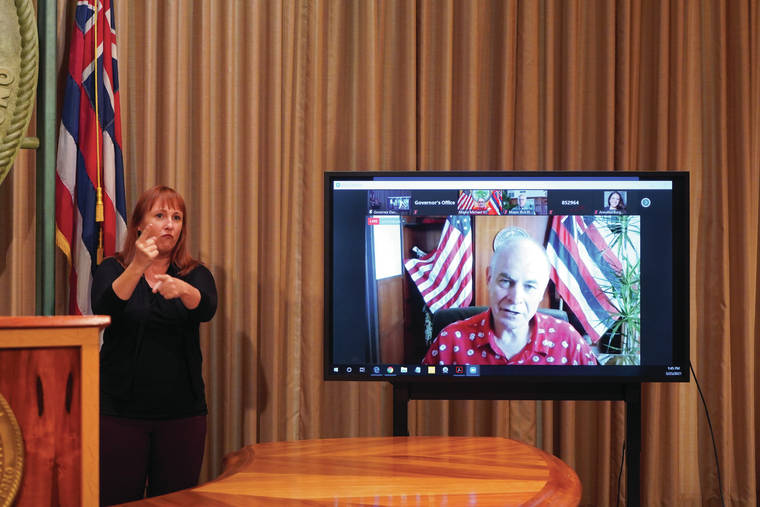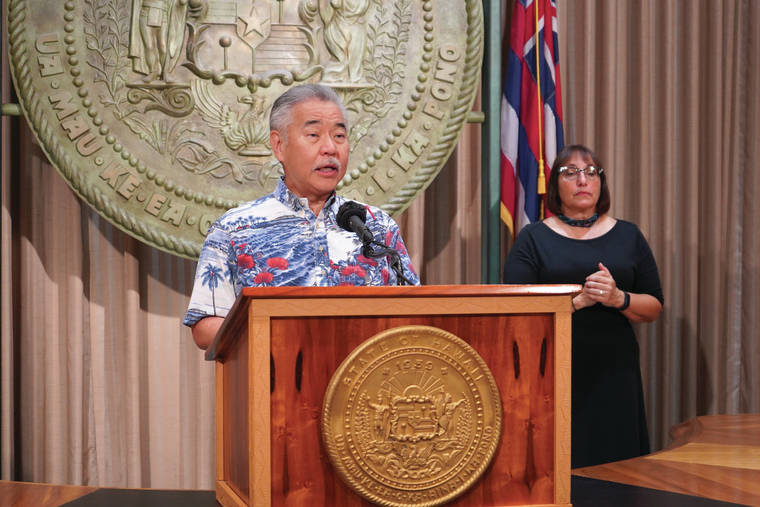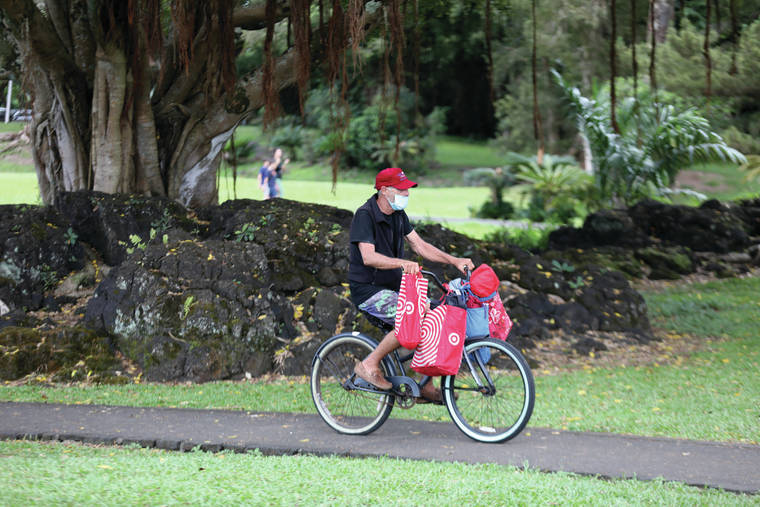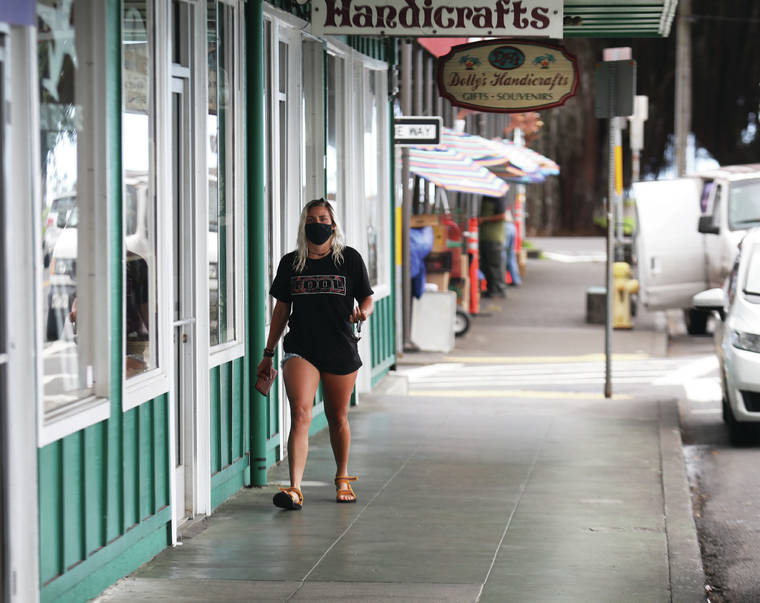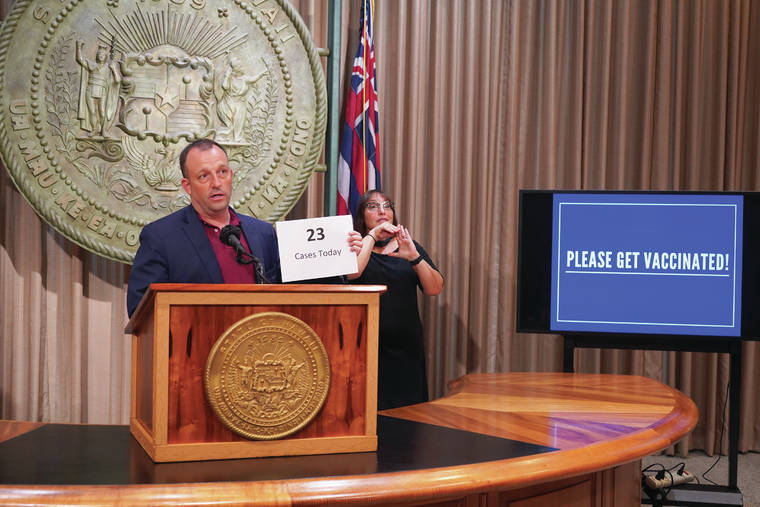Masks are no longer required outdoors after Gov. David Ige announced several changes to COVID-19 restrictions Tuesday.
During a news conference, Ige said 1.4 million doses of COVID-19 vaccines have been administered in the state, and 48% of the population has been fully vaccinated. Because of the vaccination rate, Ige issued a new emergency proclamation that rescinded a portion of the state’s mask mandate that required people to wear masks outdoors within 6 feet of others. Masks are still required indoors.
Although masks are no longer necessary outside, Ige urged people to remain cautious around others and consider wearing masks in crowds.
State Health Director Libby Char said the new rule applies to everyone in Hawaii, vaccinated or unvaccinated. This, she noted, differs from guidance from the U.S. Centers for Disease Control and Prevention, which recommended earlier this month that only vaccinated individuals can safely go unmasked.
“I don’t think we’re being unsafe about it,” Char said. “I think the data shows pretty clear now that outdoor activities are quite safe.
“That being said, we do have a recommendation that, if you are in a large group, you continue to wear a mask,” she said.
Ige did not announce any changes to outdoor gatherings, which are still limited to 10 people on Oahu and 25 in Hawaii County.
Hawaii County Mayor Mitch Roth, who attended the press conference via Zoom, said he submitted proposed changes to the county’s rules for outdoor events to Ige and hopes they will be approved soon. Those changes, he said, would expand the maximum number of attendees for indoor events from 10 to 25 and for outdoor events from 25 to 75.
Ige also announced that ocean sports such as surfing, canoeing and swimming events will be allowed to resume beginning June 1, when the state will resume issuing permits for ocean activities, and the counties will resume issuing permits for the use of parks.
“We’re excited to make significant strides toward normalcy by allowing ocean sports to resume,” said Roth in a statement. “They are a staple of our island communities and play a paramount role in the health, safety and sanity of our residents. We now know that the risk of transmitting COVID-19 in open air spaces, where adequate social distancing can be practiced, is little to none, and we thank the governor for supporting this decision.”
Ige reiterated his intention to make changes to the Safe Travels Hawaii program at some point in June. These changes will allow travelers who were fully vaccinated in Hawaii to freely travel trans-Pacific without needing a COVID test or postflight quarantine.
Later this year, Ige said the program will expand again to allow travelers who were vaccinated in other states to freely travel to Hawaii.
Lt. Gov. Josh Green thanked Ige for easing the mask restrictions, having publicly disagreed with Ige on the matter in the past.
Green said he was pleased with the current state of COVID mitigation in the state, with only 23 new cases reported Tuesday. By comparison, on April 1 there was an average of 98 new cases a day.
Green also noted more than 23,000 people have traveled interisland using their vaccination cards to avoid a pretravel COVID test, only two weeks after implementing that policy.
However, Char said the state has seen a significant rise in COVID-19 variants: About 80% of sequenced virus samples in the state were some form of variant, whether they be the variants from the United Kingdom, Brazil or California.
“We’re definitely watching, because some of those are more easily transmissible,” Char said.
Because of the uncertainty regarding COVID-19 variants and the long-term effectiveness of the vaccines, Char was unable to commit to any dates for future changes to statewide restrictions, such as ending the indoor mask mandate.
Char also said there have been no known cases in Hawaii of myocarditis connected with the vaccines. Myocarditis, an inflammation of the heart muscles, has been tentatively linked to COVID-19 vaccinations in rare circumstances, and Char said the Department of Health is monitoring for any such cases.
Email Michael Brestovansky at mbrestovansky@hawaiitribune-herald.com.







